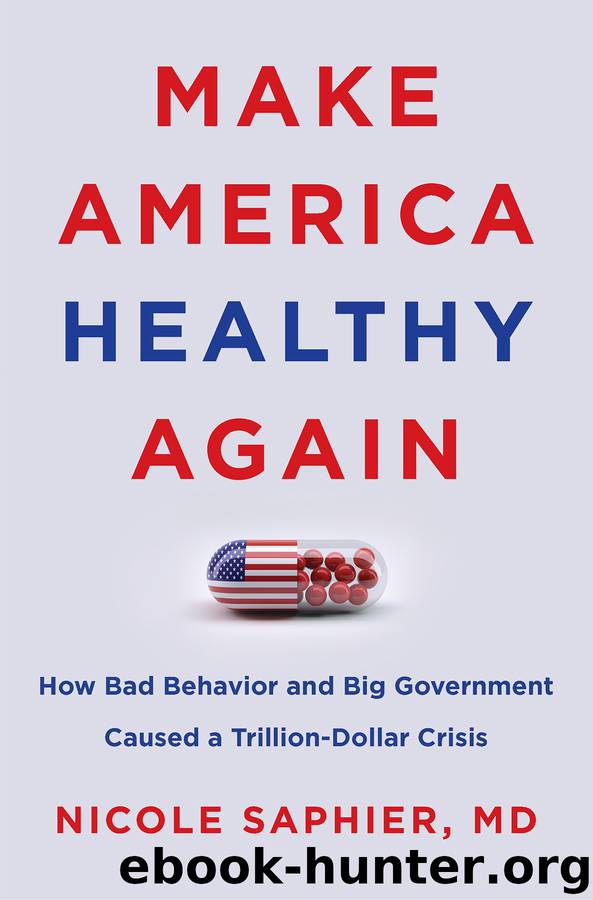Make America Healthy Again by Nicole Saphier M.D

Author:Nicole Saphier, M.D.
Language: eng
Format: epub
Publisher: HarperCollins
Published: 2020-04-21T00:00:00+00:00
The Impact of Medicaid Expansion
Nearly 14 million adults gained Medicaid coverage under the Affordable Care Act. Efforts to repeal the ACA failed largely because of the popularity of this expansion. In states that participated in Medicaid expansion (not all did), the program now covers people with incomes below 138 percent of the federal poverty level.
This is a departure from traditional Medicaid, which provided health insurance coverage for low-income Americans (up to 133 FPL). Over the years since its inception in 1965, it was expanded to cover care for the disabled, nursing home care for the aged, and other categories. Most people are under the impression Medicare will pay for a nursing home, but in fact Medicare covers only a maximum of three days after a hospital admission, then Medicaid kicks in. With increased life expectancy, 50 to 70 percent of people can expect to require significant long-term care when they pass age sixty-five. According to the Congressional Budget Office, long-term care expenditures in 2000 totaled $30 billion; by 2015 that number had climbed to $225 billion, half of which is paid for by Medicaid. Unfortunately, government intrusion into health care has made the nursing home issue more fraught. Patients are discharged faster from the hospital to control costs, which means that potentially sicker patients go into skilled-nursing facilities requiring care that should have been provided in the hospital. Additionally, with funding allocated to the millions of additional people covered under the Medicaid expansion, there is less available for others. Yes, more people are covered, but the disbursement amount is rationed.
Until now the federal share of the Medicaid expansion under the ACA was 100 percent, and as such, according to North Carolina governor Roy Cooper’s budget proposal for 2019–2020, Medicaid expansion will deplete federal funds by $1.91 billion. In 2020 the federal share will drop to 90 percent, and barring a change to the law, it will stay there. This creates a balancing act for state budgets: states will have to determine whether the Medicaid expansion actually reduces spending on uncompensated medical services or, now that they are responsible for 10 percent of the expansion, will they have to raise state taxes, too?
One can argue that, overall, Medicaid expansion brought positive change because millions more Americans obtained health insurance, but it had negative impacts outside of the obvious tax burden. For one thing, health care providers faced a rapid increase in the volume of people seeking care. People newly eligible for Medicaid lost the incentive to obtain insurance on their own as they got used to receiving government assistance. In California, where nearly one in three residents are on Medicaid, the growth of this entitlement, like most other entitlements, has proven unsustainable. Rather than making yet more people dependent on government, shouldn’t we be trying to move people into the private sector and promote financial independence? Undoubtedly, our health system has many holes, and the Medicaid program helps plug those holes. However, far too many Americans are reliant on this subsidy, which dilutes funding for those for whom Medicaid was originally developed.
Download
This site does not store any files on its server. We only index and link to content provided by other sites. Please contact the content providers to delete copyright contents if any and email us, we'll remove relevant links or contents immediately.
Nutrition for Sport, Exercise, and Health by Spano Marie & Kruskall Laura & Thomas D. Travis(3764)
Nutrition for Sport, Exercise, and Health by Marie Spano & Laura Kruskall & D. Travis Thomas(3716)
The Sprouting Book by Ann Wigmore(3576)
Flavor Flours by Alice Medrich(2848)
Superfood Smoothie Bowls: Delicious, Satisfying, Protein-Packed Blends that Boost Energy and Burn Fat by Chace Daniella(2449)
Memory Rescue by Daniel G. Amen(2416)
Dirty Genes by Ben Lynch(2306)
The Bad Food Bible by Aaron Carroll(2254)
Genius Foods by Max Lugavere(2199)
The Poisoner's Handbook by Deborah Blum(2123)
Good Calories, Bad Calories by Gary Taubes(2095)
The Main Street Vegan Academy Cookbook by Victoria Moran(2072)
The I Quit Sugar Cookbook by Sarah Wilson(2030)
Core Performance Essentials by Mark Verstegen(2004)
Memory Rescue: Supercharge Your Brain, Reverse Memory Loss, and Remember What Matters Most by Amen Dr. Daniel G(1969)
Big Girls Do It Stronger by Jasinda Wilder(1937)
Android App Development by Franceschi Hervé J.;(1841)
Sugar Crush by Dr. Richard Jacoby(1791)
Dr. Colbert's Keto Zone Diet by Don Colbert(1647)
